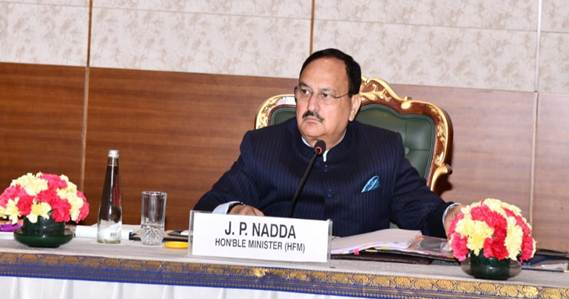New Delhi: Union Minister for Health & Family Welfare, Jagat Prakash Nadda, chaired the ninth meeting of the Mission Steering Group (MSG) of the National Health Mission (NHM) today at Bharat Mandapam, New Delhi. The high-level meeting brought together key policymakers, including Union Ministers of State for Health & Family Welfare, Prataprao Jadhav and Anupriya Patel, along with senior officials from NITI Aayog, MoHFW, and other central ministries.
As the highest decision-making body under NHM, the Mission Steering Group is responsible for shaping broad policy direction and governance for India’s healthcare sector. The meeting saw participation from health secretaries of high-focus states such as Uttarakhand, Chhattisgarh, Arunachal Pradesh, and Tripura, reflecting the Centre’s commitment to enhancing healthcare delivery at the grassroots level.
Addressing the meeting, J.P. Nadda lauded NHM’s remarkable achievements in improving India’s health indicators. He emphasized the importance of translating policy objectives into action at the grassroots level, particularly through the role of Chief Medical Officers (CMOs). He called for capacity-building initiatives to enhance their effectiveness in implementing healthcare schemes.
Recognizing the critical role of ASHA workers as the “grassroot foot soldiers” of India’s healthcare system, Nadda advocated for revised incentives and enhanced honorariums to support their welfare and motivation.
He also stressed the need for maintaining quality in healthcare infrastructure and innovations, citing the recent advancements under the Bharat Health Initiative for Sahyog Hita & Maitri (BHISHM) cubes.
The MSG meeting showcased the significant progress made under NHM in recent years, with a special focus on maternal and child health, disease elimination, and digital health initiatives. For the first time, the Pradhan Mantri-Ayushman Bharat Health Infrastructure Mission (PM-ABHIM) was included in the discussions, underscoring the government’s integrated approach to healthcare reform.
The meeting highlighted India’s achievement of the National Health Policy (NHP) target of reducing Maternal Mortality Rate (MMR) to 100 per lakh live births, reflecting an 83% decline since 1990, surpassing global averages. A 69% decline in Infant Mortality Rate (IMR) and a 75% decline in Under-5 Mortality Rate (U5MR) was observed, exceeding global reduction rates. The Total Fertility Rate (TFR) declined from 3.4 in 1992-93 to 2.0 in 2019-21, with 31 states achieving replacement-level fertility.
In terms of disease elimination, the meeting acknowledged major milestones. India was certified tetanus-free by WHO in 2015, and in October 2024, WHO declared that Trachoma had been eliminated as a public health problem in the country. India met its Kala-azar elimination target in 2023, ahead of the Sustainable Development Goal (SDG) deadline. The country also recorded a 79.3% decline in malaria cases in 2023 compared to 2014, while malaria deaths fell by 85.2% in the same period. Under the National Tuberculosis Elimination Program, India achieved an 18% reduction in TB incidence between 2015 and 2023, more than twice the global reduction rate, with a 21% drop in TB mortality.
The discussions also underscored the progress made in strengthening primary healthcare services. The government has operationalized 1.76 lakh Ayushman Arogya Mandirs nationwide, with an expanded package of services available at 85% of total facilities. Annual footfall at these centers surged from 13.49 crore in 2019-20 to 121.03 crore in 2023-24. The number of non-communicable disease (NCD) screenings rose significantly from 10.94 crore in 2019-20 to 109.55 crore in 2023-24, while teleconsultations expanded from 0.26 crore in 2019-20 to 11.83 crore in 2023-24.
Under the Sickle Cell Anemia Elimination Mission, more than 5 crore people have been screened, leading to 1.84 lakh diagnoses, with 2.24 crore sickle cell cards distributed. The Pradhan Mantri National Dialysis Program has now covered all 748 districts, benefiting 26.97 lakh patients through 3.27 crore dialysis sessions.
The MSG meeting also focused on emerging healthcare challenges and policy frameworks for the coming years. Attendees suggested increasing internet connectivity in Ayushman Arogya Mandirs to facilitate teleconsultations. They also emphasized the integration of AYUSH interventions to combat rising obesity rates through Ayushman Arogya Mandirs and strengthening NHM’s digital health initiatives to improve data monitoring and service delivery.
Nadda assured that the decisions taken during the MSG meeting will be integrated into future healthcare policies to ensure comprehensive and inclusive health coverage. He emphasized that stakeholder feedback will be instrumental in shaping new interventions to further strengthen India’s healthcare ecosystem.
Established in 2005 under the National Rural Health Mission (NRHM), later merged into NHM, the Mission Steering Group (MSG) plays a pivotal role in approving financial norms and guiding policy decisions. Since its inception, it has held 18 meetings (9 under NRHM and 9 under NHM), continuously evolving strategies to enhance healthcare service delivery in India.
With healthcare transformation at the core of the government’s agenda, the Mission Steering Group remains instrumental in driving policy changes, strengthening infrastructure, and ensuring effective implementation of national health programs. The latest MSG meeting reaffirmed the government’s commitment to achieving universal health coverage, reducing disease burdens, and delivering quality, accessible, and affordable healthcare to every citizen.





